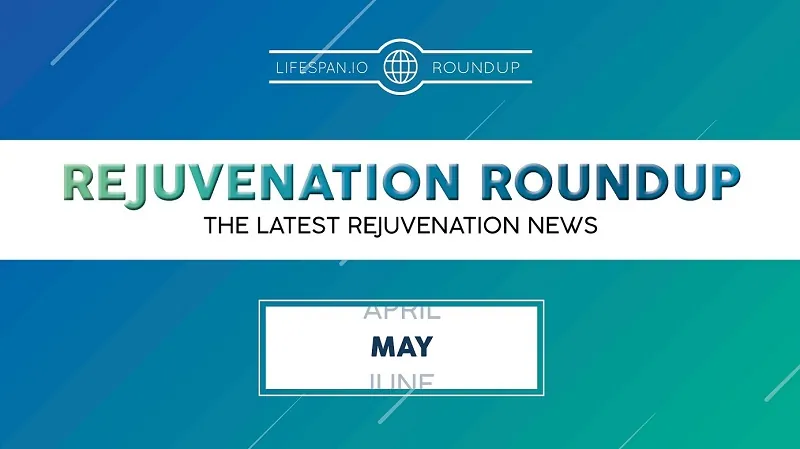Two days ago, the United States honored its fallen veterans. How many of those heroes came home, having survived the horrors of war, only to have their own bodies betray them decades later? Here’s some of what’s been done to fight aging in May.
LEAF News
Lifespan News
 Learned Helplessness: We discuss the idea that people have learned to accept something that they don’t need to accept anymore on this episode of Lifespan News.
Learned Helplessness: We discuss the idea that people have learned to accept something that they don’t need to accept anymore on this episode of Lifespan News.
Plastic Nanoparticles: This episode is on how plastic nanoparticles might lead to at least one hallmark of aging being accelerated.
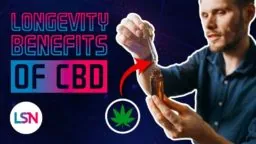 CBD and Autophagy: On this episode of Lifespan News, Ryan O’Shea discusses how CBD promotes autophagy, our cells’ ability to clear out damaged components.
CBD and Autophagy: On this episode of Lifespan News, Ryan O’Shea discusses how CBD promotes autophagy, our cells’ ability to clear out damaged components.
Young Cerebrospinal Fluid: Researchers have exchanged cerebrospinal fluid between young and old mice in order to determine if it has the same longevity effects that blood exchange has.
Interviews
Yuri Deigin on Cellular Reprogramming in Humans: In a recent press release, YouthBio Therapeutics announced that it has left stealth mode. YouthBio is a self-proclaimed longevity biotech company with a focus on developing gene therapies that reverse the epigenetic alterations that cause us to age.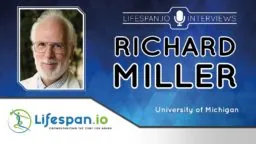 Prof. Richard Miller on the Intervention Testing Program: Richard A. Miller is a Professor of Pathology at the University of Michigan and the Director of Michigan’s Paul F. Glenn Center for Biology of Aging Research. He is also a driving force behind the ITP, the Interventions Testing Program, created in the early 2000s to study the effect of various drugs on lifespan in mice.
Prof. Richard Miller on the Intervention Testing Program: Richard A. Miller is a Professor of Pathology at the University of Michigan and the Director of Michigan’s Paul F. Glenn Center for Biology of Aging Research. He is also a driving force behind the ITP, the Interventions Testing Program, created in the early 2000s to study the effect of various drugs on lifespan in mice.
João Pedro de Magalhães on Reprogramming and Aging Theories: Professor João Pedro de Magalhães leads the Genomics of Ageing and Rejuvenation Lab at the Institute of Inflammation and Ageing in the University of Birmingham. He is also CSO of YouthBio Therapeutics, a US-based biotech company that develops rejuvenation gene therapies based on partial reprogramming by Yamanaka factors.
 Discussing Crowd Funded Cures with Savva Kerdemelidis: We have written extensively about VitaDAO, a collective dedicated to community-governed, decentralized drug development. We asked Savva Kerdemelidis a few questions for a deeper dive into the world of DAOs, PFS contracts, and intellectual property on the blockchain.
Discussing Crowd Funded Cures with Savva Kerdemelidis: We have written extensively about VitaDAO, a collective dedicated to community-governed, decentralized drug development. We asked Savva Kerdemelidis a few questions for a deeper dive into the world of DAOs, PFS contracts, and intellectual property on the blockchain.
Reprogramming Cells with Vittorio Sebastiano of Turn.bio: Vittorio Sebastiano is an Associate Professor (Research) of Obstetrics and Gynecology at Stanford University and one of the most prominent scientists in the emerging field of cellular reprogramming. He is also co-founder and Scientific Advisory Board Chairman of Turn Biotechnologies, a cellular rejuvenation company based on the research done in Sebastiano’s Stanford lab.
Rejuvenation Roundup Podcast
Ryan O’Shea of Future Grind hosts this month’s podcast, showcasing the events and research discussed here.
Journal Club
Fecal transfer between young and aged mice reverses hallmarks of aging: On this month’s Journal Club, Dr. Oliver Medvedik explored a recent paper where researchers showed that transfering fecal microbiota from young to old mice reversed some aspects of aging.
Research Roundup
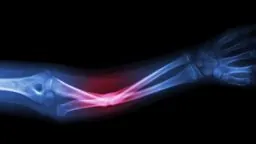 Senescent Cells Slow Bone Healing: A study published in the Journal of Clinical Investigation has reported that senescent cells are largely responsible for slow bone healing in aged animals and that senolytics, which remove these harmful cells, can speed bone regeneration.
Senescent Cells Slow Bone Healing: A study published in the Journal of Clinical Investigation has reported that senescent cells are largely responsible for slow bone healing in aged animals and that senolytics, which remove these harmful cells, can speed bone regeneration.
Longevity in Centenarians Linked to Lower Ribosomal Activity: Scientists have discovered a possible mechanism that protects extremely long-lived people from aging.
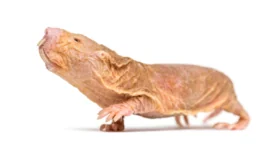 Why The Skin of Naked Mole Rats Ages Slowly: A study published in Aging has shown that the skin of the naked mole rat retains nearly all of its physical and biochemical properties as these animals chronologically age, providing new insight into how and why these animals live so long.
Why The Skin of Naked Mole Rats Ages Slowly: A study published in Aging has shown that the skin of the naked mole rat retains nearly all of its physical and biochemical properties as these animals chronologically age, providing new insight into how and why these animals live so long.
Cannabidiol Increases Lifespan and Healthspan in Worms: Scientists have shown that an active ingredient of cannabis significantly upregulates autophagy, extending both lifespan and healthspan in C. elegans nematode worms.
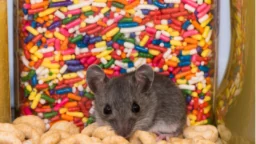 The Gut Microbiome Affects the Brain, Eyes, and Gut in Mice: Publishing in Microbiome, a team of researchers has ascertained multiple physical effects of aging gut flora in mice.
The Gut Microbiome Affects the Brain, Eyes, and Gut in Mice: Publishing in Microbiome, a team of researchers has ascertained multiple physical effects of aging gut flora in mice.
NMN Boosts Effectiveness of Immunotherapy in Mice: In a pre-print paper, scientists have shown that treatment with NMN increases the survival and anti-cancer efficacy of CAR-T cells. T cells are a central element of the adaptive immune system, and some of them can be cytotoxic: they have the ability to kill other cells.
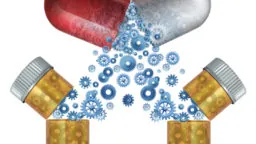 Drug Cocktail Delays Aging in Mice: Scientists have shown that a combination of rapamycin, acarbose, and phenylbutyrate has a synergetic rejuvenation effect when administered to 20-month-old mice for three months.
Drug Cocktail Delays Aging in Mice: Scientists have shown that a combination of rapamycin, acarbose, and phenylbutyrate has a synergetic rejuvenation effect when administered to 20-month-old mice for three months.
Walking Pace Correlated with Increased Telomere Length: Publishing in Nature Communications, Dr. Tom Yate, Dr. Neliesh J. Samani, and colleagues used data from approximately 400,000 people in the UK Biobank in order to examine the relationship between walking pace and telomere length.
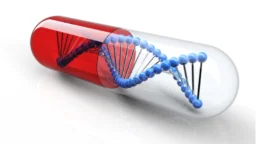 Using an Endemic Virus as a Gene Therapy for Life Extension: In a study printed in PNAS, researchers have shown that telomerase reverse transcriptase (TERT) can be given to cells in living mice through a viral vector, taking the idea of life-extending gene therapies from science fiction to reality.
Using an Endemic Virus as a Gene Therapy for Life Extension: In a study printed in PNAS, researchers have shown that telomerase reverse transcriptase (TERT) can be given to cells in living mice through a viral vector, taking the idea of life-extending gene therapies from science fiction to reality.
Caloric Restriction, Feeding Times Lengthen Mouse Lifespan: In a new study published in Science, researchers show that caloric restriction and time-restricted feeding have an additive effect on lifespan in mice. Caloric restriction is considered the first intervention to reliably show that aging is a malleable phenomenon.
 FOXM1 Induction Extends Lifespan in Mice: In a new study published in Nature Aging, researchers have shown that inducing a truncated FOXM1 gene extends lifespan in both progeric and naturally aging mice. Forkhead box (FOX) genes are transcription factors: genes that drive the expression of other genes.
FOXM1 Induction Extends Lifespan in Mice: In a new study published in Nature Aging, researchers have shown that inducing a truncated FOXM1 gene extends lifespan in both progeric and naturally aging mice. Forkhead box (FOX) genes are transcription factors: genes that drive the expression of other genes.
The Role of Mitochondrial Antioxidants in Longevity: A study published in Redox Biology has reported that the upregulation of thioredoxin, a fundamental part of mitochondrial defense against reactive oxygen species, is associated with longevity in mutant C. elegans worms.
 “The Perfect Diet” May Increase Lifespan by 13 Years: Scientists from Norway have built a model that predicts the effect of various dietary changes on human lifespan. Diet is obviously a major health factor, but quantifying its impact is not easy.
“The Perfect Diet” May Increase Lifespan by 13 Years: Scientists from Norway have built a model that predicts the effect of various dietary changes on human lifespan. Diet is obviously a major health factor, but quantifying its impact is not easy.
Biological Aging Fluctuates with Stress: A preprint published in bioRxiv has demonstrated that the second-generation aging clocks PhenoAge, DunedinPACE, and GrimAge show increased but reversible age acceleration in mice and people exposed to significant stress.
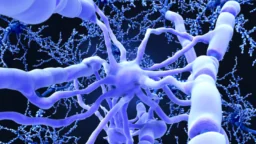 Young Cerebrospinal Fluid Improves Memory in Mice: Scientists have found that infusing old mice with cerebrospinal fluid obtained from young mice improves their memory by increasing the proliferation and differentiation of oligodendrocyte progenitor cells.
Young Cerebrospinal Fluid Improves Memory in Mice: Scientists have found that infusing old mice with cerebrospinal fluid obtained from young mice improves their memory by increasing the proliferation and differentiation of oligodendrocyte progenitor cells.
Lithium Use Might Lower Risk of Dementia: A study published in Plos Medicine has shown that lithium decreases the risk of developing dementia and some of its subtypes, including Alzheimer’s disease and vascular dementia.
 Blood Pressure Linked to Dementia, Mortality in Older People: A recent study from the Journal of the American College of Cardiology, conducted by Dr. Wuxiang Xie and colleagues, examined the association of blood pressure with cognitive decline, dementia, and mortality.
Blood Pressure Linked to Dementia, Mortality in Older People: A recent study from the Journal of the American College of Cardiology, conducted by Dr. Wuxiang Xie and colleagues, examined the association of blood pressure with cognitive decline, dementia, and mortality.
Visually Identifying Senescent Cells with an Algorithm: A team of researchers publishing in Aging has developed a method of identifying senescent cells through their physical morphology, potentially making future senescence research much easier. Before modern biomarkers of senescence were eludicated, cell size was considered to be one of its defining features.
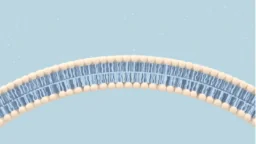 Plasmalogens Alleviate Age-Related Cognitive Decline in Mice: Scientists have learned that plasmalogens, obscure but important lipids, serve as a mediator of neurogenesis and synaptic health and can reverse age-related cognitive decline in mice. Plasmalogens are a subtype of phospholipids, the molecules that cellular membranes are mostly made of.
Plasmalogens Alleviate Age-Related Cognitive Decline in Mice: Scientists have learned that plasmalogens, obscure but important lipids, serve as a mediator of neurogenesis and synaptic health and can reverse age-related cognitive decline in mice. Plasmalogens are a subtype of phospholipids, the molecules that cellular membranes are mostly made of.
Chloroquine Increases Lifespan in Male Mice: Researchers publishing in Aging have found that the anti-malarial drug chloroquine increases lifespan in the males of a standard breed of mice. The reasons seem to be contradictory.
 Not All Hallmarks of Aging Contribute to Epigenetic Age: Scientists have shown that only some of the hallmarks of aging affect methylation clocks, which are widely used to measure biological age.
Not All Hallmarks of Aging Contribute to Epigenetic Age: Scientists have shown that only some of the hallmarks of aging affect methylation clocks, which are widely used to measure biological age.
Impact of modifiable healthy lifestyle adoption on lifetime gain from middle to older age: The findings imply the importance of improving the one’s lifestyle for an increased lifespan, even among older patients and/or those with multimorbidity.
Association of Serum Antioxidant Vitamins and Carotenoids With Incident Alzheimer Disease and All-Cause Dementia Among US Adults: Incident all-cause dementia was inversely associated with serum lutein+zeaxanthin and β-cryptoxanthin levels.
Astaxanthin Influence on Health Outcomes of Adults at Risk of Metabolic Syndrome: Results show marginal effects of astaxanthin on reduction in total cholesterol and systolic blood pressure, and a significant attenuating effect on low-density lipoprotein cholesterol.
A Controlled Study to Evaluate the Efficacy and Safety of an NMN Supplement in Middle Aged and Older Adults: The primary efficacy parameter, NAD+/NADH levels in the serum, had increased by 11.3% in the active group (Uthever group) at day 30, whereas no change was observed in the placebo group at all.
Long-term low-dose acetylsalicylic shown to protect against vascular dementia and Alzheimer’s disease in patients with coronary heart disease: The protective potential of low-dose acetylsalicylic for these diseases seems to strongly depend on pre-existing coronary heart disease and the willingness of patients to take it for a minimum of ten years.
Vitamin D supplementation is associated with slower epigenetic aging: Intake of vitamin D supplements is associated with reduced epigenetic age acceleration in participants with vitamin D deficiency.
Urolithin A improves muscle strength, exercise performance, and biomarkers of mitochondrial health in a randomized trial in middle-aged adults: Levels of plasma acylcarnitines and C-reactive proteins are significantly lower with Urolithin A, indicating higher mitochondrial efficiency and reduced inflammation.
Effects of Spermidine Supplementation on Cognition and Biomarkers in Older Adults With Subjective Cognitive Decline: In this randomized clinical trial, longer-term spermidine supplementation in participants with subjective cognitive decline did not modify memory and biomarkers compared with placebo. Exploratory analyses indicated possible beneficial effects on verbal memory and inflammation that need to be validated in future studies at higher dosage.
Heterochronic parabiosis induces stem cell revitalization and systemic rejuvenation across aged tissues: Hematopoietic stem and progenitor cells are one of the most responsive cell types to young blood exposure, from which a continuum of cell state changes across the hematopoietic and immune system emanate.
The Protective Effects of Osteocyte-Derived Extracellular Vesicles Against Alzheimer’s Disease Diminished with Aging: This study uncovers the role of OCY-EV as a regulator of brain health, suggesting a novel mechanism in bone-brain communication.
Analysis of senescence in gingival tissues and gingival fibroblast cultures: The potential of senolytic drugs to modify aging-related changes in the gingiva was shown.
Short senolytic or senostatic interventions rescue progression of radiation-induced frailty and premature ageing in mice: This study suggests that the progression of adverse long-term health and quality-of-life effects of radiation exposure, as experienced by cancer survivors, might be rescued by short-term adjuvant anti-senescence interventions.
News Nuggets
BioAge Is Developing Novel NLRP3 Inhibitors: BioAge Labs is developing a class of compounds that have been shown to inhibit the NLRP3 protein, which has been linked to all-cause mortality, in mouse models and human cells. These compounds can be taken orally and cross the blood-brain barrier.
 Decentralized Science Event Happened May 23-24 in Berlin: The future of research funding is changing, and DeSci is set to play a key role in that. Focusing on how science will change in the future, the DeSci.Berlin event happened on May 23 and 24.
Decentralized Science Event Happened May 23-24 in Berlin: The future of research funding is changing, and DeSci is set to play a key role in that. Focusing on how science will change in the future, the DeSci.Berlin event happened on May 23 and 24.
Coming Up
Rejuvenation Startup Summit to Be Held in Berlin: Another aging conference has been announced in Berlin, Germany. In this event, the Forever Healthy Foundation will be focusing on people developing new companies with the aim of helping people live longer, healthier lives.

